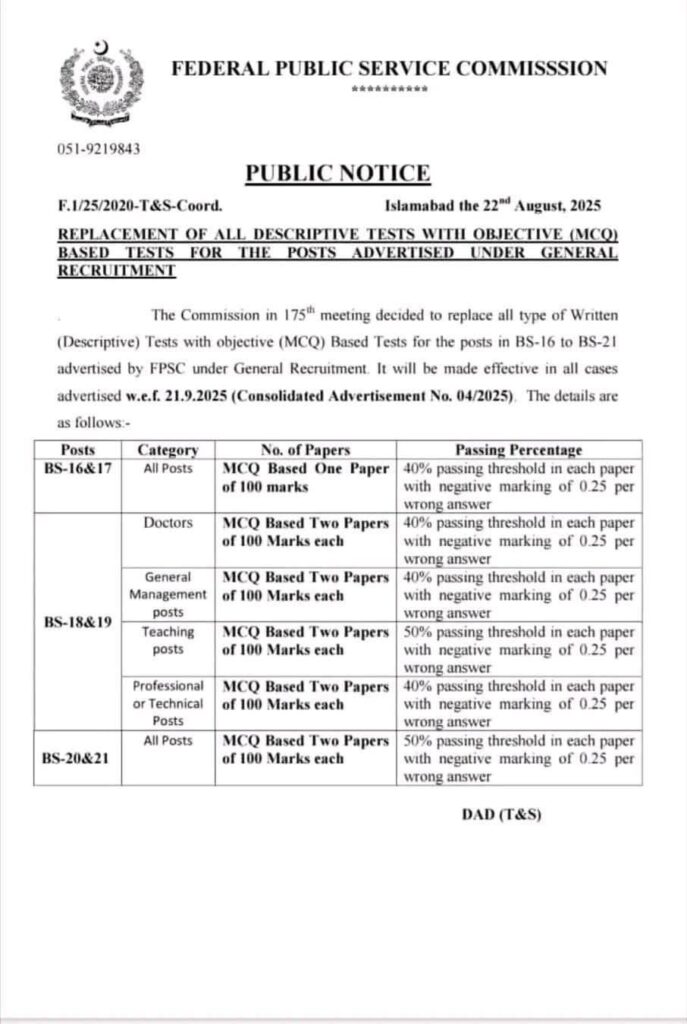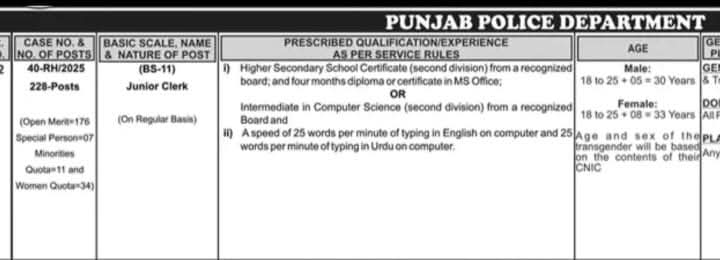FPSC Test Changes 2025
FPSC Test Changes 2025
Contents
FPSC Test Changes 2025
It is a public notice from the Federal Public Service Commission (FPSC) in Pakistan, dated August 22, 2025. The notice states that the commission has decided to replace all descriptive written tests with objective (MCQ) based tests for posts advertised under General Recruitment, specifically for posts from BS-16 to BS-21. This change is effective from September 21, 2025.
The notice also provides details on the new testing format, including the number of papers, the number of marks per paper, and the passing percentage for different posts. It also mentions a negative marking of 0.25 for each wrong answer. The notice categorizes the posts as BS-16&17, BS-18&19, and BS-20&21, with subcategories for doctors, general management, teaching, and professional/technical posts.
Based on this information, the main keyword for the blog post should be “FPSC test changes” or something similar that reflects the topic of the notice. The blog post should explain what these changes mean for candidates, how to prepare for the new MCQ format, and what the new passing criteria are. I will create a blog post that follows all the specified guidelines, including SEO optimization, readability, and content structure.
FPSC Test Changes: What You Need to Know
Meta Description: The Federal Public Service Commission is changing its written tests to an MCQ format. Learn all about the new FPSC test changes, including the passing criteria and how to prepare.
If you’re preparing for a Federal Public Service Commission (FPSC) test, you’ve probably heard about the recent and significant changes. The era of descriptive, written tests is over, and a new chapter of objective, MCQ-based exams has begun. This shift, announced in a public notice dated August 22, 2025, will affect all candidates applying for positions from BS-16 to BS-21 under General Recruitment. These FPSC test changes are effective from September 21, 2025. This move aims to streamline the testing process and likely reduce the time it takes to announce results. But what does this mean for you, the aspirant? This article will break down everything you need to know about the new format, so you can adapt your preparation strategy and stay ahead of the curve.
Understanding the New FPSC Exam Format
The most crucial detail is the transition from a descriptive format to a multiple-choice questions (MCQ) format. This change applies to all written tests for the specified pay scales. This is a game-changer, as it requires a different approach to studying. Instead of focusing on essay writing and in-depth analysis for long-form answers, you will now need to focus on quick recall and a broad understanding of topics. The new format is designed to test your knowledge across a wider range of subjects efficiently.
Detailed Breakdown of the New Test Structure
The FPSC has outlined a clear structure for the new MCQ tests. The number of papers and the passing percentages vary depending on the post and pay scale. It’s vital to know exactly what is expected for your specific position to prepare effectively.
BS-16 & 17 Posts
For candidates applying for positions in BS-16 and BS-17, the structure is relatively straightforward:
- All Posts: You will have one MCQ-based paper of 100 marks.
- Passing Percentage: You must achieve a 40% passing threshold in this single paper.
- Negative Marking: There is a negative marking of 0.25 for each wrong answer.
BS-18 & 19 Posts
The structure for these posts is more detailed and depends on your field.
Doctors:
- No. of Papers: You will take two MCQ-based papers, each worth 100 marks.
- Passing Percentage: The passing threshold is 40% for each paper.
- Negative Marking: A 0.25 mark penalty for every incorrect answer.
General Management, Teaching, Professional, & Technical Posts:
- No. of Papers: Just like doctors, you will have two MCQ-based papers of 100 marks each.
- Passing Percentage: General Management, Teaching, and Professional/Technical posts all have a 40% passing threshold per paper.
- Negative Marking: The same 0.25 negative marking applies.
BS-20 & 21 Posts
For the higher-level posts, the passing requirements are slightly different.
- All Posts: You will sit for two MCQ-based papers, each 100 marks.
- Passing Percentage: The passing threshold is 50% for each paper. This is a higher requirement than for the lower-scale posts, indicating a need for a higher level of expertise.
- Negative Marking: A 0.25 mark deduction for each wrong answer.
How to Prepare for the New MCQ Format
The shift to MCQs demands a change in your study strategy. Here are some key tips to help you succeed:
- Focus on Comprehension over Memorization: While rote learning can help, understanding the core concepts is crucial for tackling tricky questions.
- Practice with Mock Tests: The best way to get used to the MCQ format is to practice. Use online resources and past papers to simulate exam conditions.
- Manage Your Time Wisely: With negative marking, it’s a good idea to skip questions you are unsure about to avoid losing marks.
- Strengthen Your Weaknesses: Identify your weak areas and dedicate more time to them. Since the test covers a wide range of topics, a balanced preparation is key.
Frequently Asked Questions
What is the new FPSC test format?
The new format replaces all descriptive written tests with objective, multiple-choice questions (MCQ) based tests for posts from BS-16 to BS-21. This change is effective from September 21, 2025.
Is there negative marking in the new FPSC exams?
Yes, there is a negative marking of 0.25 for each wrong answer in the new MCQ-based tests. This makes it important to be careful with your answers.
What is the passing percentage for BS-16 & 17 posts?
Candidates for BS-16 and 17 posts must achieve a 40% passing threshold in the single 100-mark MCQ paper.
How many papers are there for BS-18 & 19 posts?
For most BS-18 and 19 posts, including doctors, general management, and professional roles, there will be two separate MCQ papers, each with 100 marks.
Is the new format applicable to all FPSC jobs?
The public notice specifies that the new format is for “all posts advertised under General Recruitment” from BS-16 to BS-21.
How can I prepare for the new MCQ tests?
Focus on a wide range of topics, practice with mock tests, manage your time effectively, and try to understand concepts rather than just memorizing facts.
Will the syllabus change with the new format?
While the format is changing, the core syllabus is expected to remain the same. The questions will now be structured in an MCQ format instead of requiring a descriptive answer.
Conclusion
The recent FPSC test changes mark a major shift in the recruitment process. By moving to an MCQ-based system, the commission is embracing a more modern, efficient, and objective method of evaluating candidates. While this may seem daunting, it is a positive step that can lead to faster results and a more transparent process. By understanding the new format and adapting your preparation strategy, you can confidently tackle these changes. Don’t let this catch you off guard; start preparing for the new format today.
Have you started preparing for the new MCQ format? Share your study tips and experiences in the comments below!

